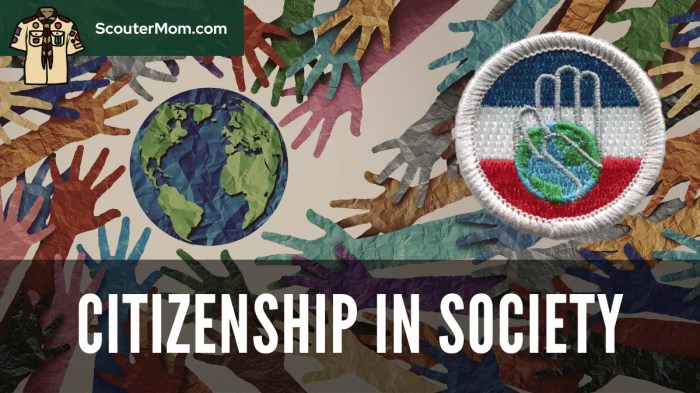The Citizen in the Community Merit Badge Workbook, an invaluable resource for fostering active and responsible citizenship, embarks on an exploration of the multifaceted nature of community involvement. Through its insightful content, this workbook empowers individuals to grasp the significance of citizenship, embrace their responsibilities, and harness their potential as agents of positive change within their communities.
Delving into the intricacies of citizenship, the workbook unravels the concept’s foundational principles, illuminating the diverse avenues through which individuals can embody its ideals. By examining the interplay between rights and responsibilities, the workbook emphasizes the symbiotic relationship between personal empowerment and communal well-being.
1. Defining Citizenship in the Community: Citizen In The Community Merit Badge Workbook

Citizenship within a community encompasses the rights, responsibilities, and active participation of individuals in their local society. It signifies a sense of belonging, shared values, and a commitment to contribute to the well-being of the community.
Individuals can demonstrate citizenship through various actions, including volunteering, participating in local government, supporting community initiatives, and respecting the rights of others. By actively engaging in their community, citizens foster a sense of ownership and responsibility for their shared environment.
Responsibilities of Citizens
- Obey the law and respect the rights of others
- Participate in local government and decision-making
- Pay taxes and support community services
- Protect and preserve the environment
- Volunteer and contribute to community organizations
Rights of Citizens, Citizen in the community merit badge workbook
- Freedom of speech, assembly, and religion
- Access to education, healthcare, and other essential services
- Fair and impartial treatment under the law
- Protection from discrimination and abuse
- Right to vote and hold elected office
FAQ Insights
What are the key responsibilities of citizens within a community?
As citizens, we bear the responsibility to obey laws, participate in civic processes, contribute to the community’s well-being, and respect the rights of others.
How can individuals get involved in their community?
Community involvement can take various forms, including volunteering, attending community meetings, joining local organizations, and participating in neighborhood improvement initiatives.
What are the benefits of community involvement?
Community involvement fosters a sense of belonging, strengthens social connections, enhances civic skills, and contributes to the overall vitality of the community.
What role do leaders play in shaping a community?
Leaders serve as catalysts for community progress, inspiring and guiding others through their vision, decision-making, and ability to mobilize resources.
How can citizens make a positive impact on their community?
Citizens can make a meaningful difference by engaging in civic activities, advocating for social justice, supporting local businesses, and actively participating in community decision-making.


